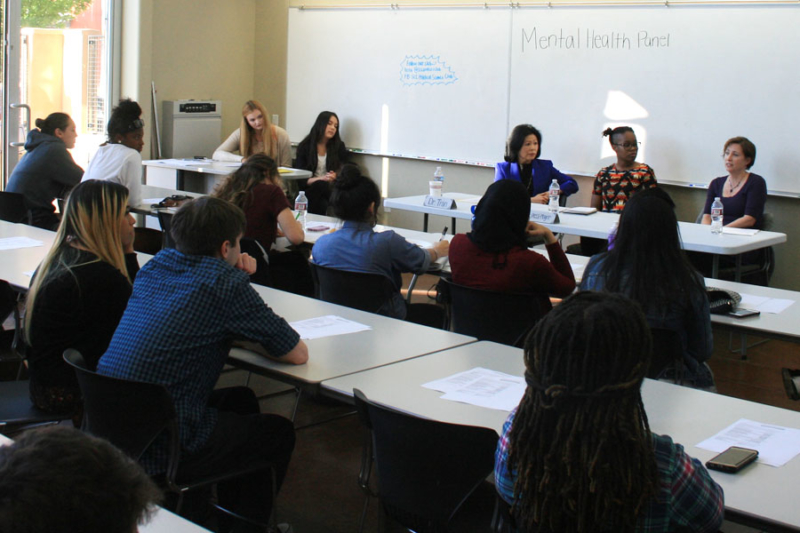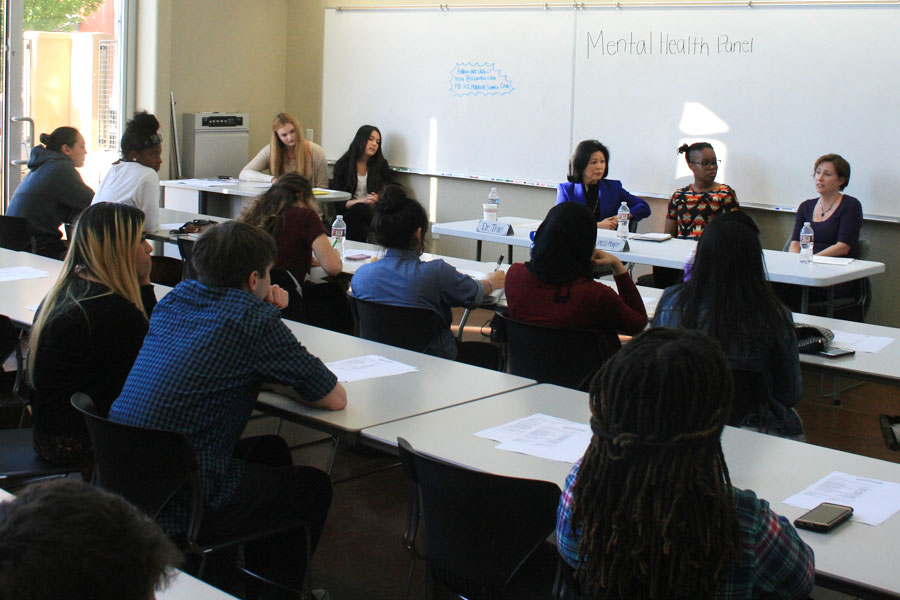DHS alumni at Sac City organize panel on mental health
 By Lev Farris Goldenberg,
By Lev Farris Goldenberg,
BlueDevilHUB.com Staff–
Seven Davis High alumni helped to organize a panel discussion and Q & A on mental health with three local experts on Thursday, April 27 at the Sacramento City College Davis campus. Each expert gave remarks on the topics of mental health, prisoners with disabilities, cross-cultural and trauma therapy with women and maternal mental health.
The alumni were a part of the Sacramento City College Political Science Club and all of them plan to transfer to UCs in the future. Carina Hinton and Zoe Vikstrom were moderators at the panel, while former Blue Devils Bismah Siddiqi, Qudsiah Siddiqi, Kyle Mananquil, Jade Phoenix-Miller and Jeffrey Whalen watched.
“This club posed the perfect option for me to have discussions with my fellow club members on political issues, put on events with psychologists as well as other experts in the field of politics educating the community on pressing and current issues, and to be surrounded by like-minded and open minded individuals who are motivated and who inspire me,” Hinton said.
The first speaker, Carolee Tran, is an Associate Professor at UC Davis in the Department of Psychiatry and has a private practice in Sacramento. In her remarks she focused on mental health among college students.
Tran said rates of mental health problems have seen a jump from 10 to 15 percent of college students with significant mental health problems in the 1980s, to 33 to 40 percent now. According to Tran, people with a higher risk of mental illness include trauma survivors, subjects of bullying and sexual abuse, veterans who experienced combat, people who have experienced racism, sexism, and homophobia and people with a “family history of certain mental illnesses.” However, other factors may include social media and financial pressure, according to Tran.
Tran went on to share three stories of college students who worked with her to recover and learn to manage their mental illnesses. All three went on to lead more successful and fulfilling lives, thanks to Tran’s strategies.
Finally, Tran called on the audience to “reach out and get support if you are dealing with issues of mental illness,” to support and talk to anyone they know who is dealing with these issues and to “speak out against all forms of injustice.”
She cited the 2014 National College Health Assessment, which reported that “33% reported feeling so depressed within the past year that they found it difficult to function.”
The doctor took a strong stance on the issue.
“We must expose hate and bigotry whenever we see it and do our utmost to prevent America’s ugly past from repeating itself in the here and now,” Tran concluded.
The second speaker, Tiffanei Ressl-Moyer, is a post-graduate legal fellow in the Mental Health Practice group at Disability Rights California. Her work includes reducing abuse of mental health clients in state hospitals and jail facilities, according to the moderators.
Speaking to the local crowd, Ressl-Moyer focused on mental health in jails. According to a report by the Bureau of Justice from 2005, “more than half of all prison and jail inmates had a mental health problem, including 705,600 inmates in State prisons, 78,800 in Federal prisons, and 479,900 in local jails.” And 12 years later, Ressl-Moyer states that two million people with mental illness are booked into jails each year.
Ressl-Moyer mentioned that a disproportionate amount of inmates in jails and prison are minorities. She also mentioned the benefits of deinstitutionalization. This means getting people with mental health problems out of institutions, and able to live in their community with the treatment and support of health-care professionals or facilities.
While delving into the history of mental health, Ressl-Moyer mentioned the Short-Doyle Act of 1957. According to the National Center for Biotechnology Information, the US National Library of Medicine, and the National Institutes of Health, the Short-Doyle Act sought to “encourage the treatment of a patient suffering from a psychiatric disorder in his home community, with the assistance of local medical resources.”
“We criminalize homelessness,” Ressl-Moyer said.
In her remarks, Ressl-Moyer mentioned that homelessness and incarceration rates skyrocketed during the Reagan Era. She said the problem with jailing mental health patients is conditions in jail exacerbate mental illnesses and even cause jail mates who didn’t have mental issues going into jail to develop them.
The United Nations has said that more than 15 days of solitary confinement qualifies as torture. Not to mention it can severely damage people who already have mental health issues.
Ressl-Moyer also talked about people in jail being disciplined (such as with solitary confinement) for displaying characteristics of a mental health illness they can not control. For example, she described a man who was arrested for schizophrenic behavior, disciplined for the same behavior and finally put in solitary confinement. When he was finally released, Ressl Moyer said, he committed suicide.
Ressl-Moyer is working to prevent these types of things from happening.
The third and final speaker, Dr. Catherine Brennan, an adult and adolescent psychiatrist with Community Psychiatry in Davis, talked about the environmental and social factors that contribute to the development of a mental illness. She described her process of diagnosing a child and said that changing the environment and biology can be beneficial to children.
Brennan thinks more societal pressures, increased medicalization, shorter attention spans and more isolation resulting from an unintegrated mental health system have led to the uptick in the prevalence of mental health illnesses.
During the Q & A the panel discussed the benefits of marijuana and also its harmful effects. CBD, an anti-inflammatory agent in marijuana was discussed and the panel mentioned that inflammation plays a strong role in the development of mental health illnesses.
The panael also covered the depth in which police officers and guards in jails had to be trained to be eligible to evaluate people as to what their level of mental health really is.
Sacramento County implemented mental health training for police officers, but Ressl thinks they aren’t helpful because police still kill people with mental illnesses.
The panel agreed that it is important to define the criminal justice system and the mental health system from one another.


